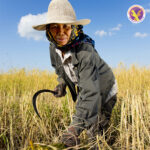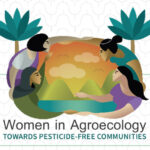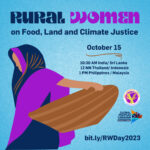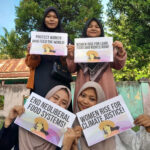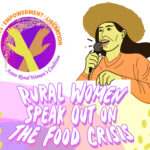Rural and Indigenous Women Assert Food Sovereignty!
World Rural Women’s Day, 15th October
World “Foodless” Day, 16th October
2008
15 October 2008, the first International Day of Rural Women
“World Rural Women’s Day” was put forward on 15 October, the eve of World Food Day, by international NGOs at the Fourth World Conference on Women in Beijing in 1995. It has been celebrated primarily by civil society, across the world for over a decade to highlight the role played by rural women in food production and food security. And 15 October 2008, the first International Day of Rural Women will be observed as established by the UN General Assembly in its resolution 62/136 of 18 December 2007, which recognizes “the critical role and contribution of rural women, including indigenous women, in enhancing agricultural and rural development, improving food security and eradicating rural poverty.”
Indeed, rural and indigenous women in the Asia Pacific region engage in agriculture, fishing, herding, and small scale businesses. They also care for livestock, fetch water and firewood for family use, and also raise their children and care for the elderly. Hindu women in Pakistan participate in nearly all work in the land in addition to their work at home. In the summer, work in the field includes cotton and onion seed sowing as well as cutting the wheat harvest. In winter, work includes cotton picking, sowing wheat seed and cutting sugarcane. Women are also responsible for clearing the land after cotton picking, sowing wheat seed, cutting sugarcane, and picking vegetables. Rural women continue to struggle with dual responsibilities of economic production and domestic labour as well as multiple social and cultural activities that are critical to the survival of rural and indigenous households and communities.
Despite the essential economic roles they perform, lack of awareness and lack of appreciation of rural women’s productive roles in the region have undervalued their contribution. The result is enduring discrimination in women’s access to resources and opportunities. Women have significantly less access to financial, physical and social assets than men do: fewer opportunities to improve their knowledge and skills; and less voice in public decision making.
The current food crisis affecting the world is the latest calamity to hit the rural women and other poor and marginalised peoples in every developing country. The price of rice, wheat, soy, corn and other staples has skyrocketed. This year, Food and Agriculture Organization (FAO) estimated that 850 million people do not get enough food to eat in the world. Three-quarters of them live in rural areas, mainly in the villages of Asia Pacific and Africa, and seven out of ten are women and girls.
The world food crisis that rural and indigenous women have been experiencing is the cumulative effect of nearly three decades of neoliberal market policies, namely, privatisation, deregulation and trade liberalisation. It is the result of the corporate agriculture practices being promoted and pushed through the World Trade Organisation (WTO) and international financial institutions (IFIs) such as WB, IMF, and ADB. In the post-colonial, post-war era, Green Revolution, a chemically driven agricultural production system, was pushed in the vast agrarian land of the developing world, and made farmers dependent on external inputs such as chemical fertilizers, toxic pesticides and chemical-dependent high yielding varieties of seeds designed to benefit the profit-oriented global agro-business corporation.
In the age of globalisation, the WB and IMF through structural adjustment programmes and the Agreement on Agriculture (AoA) of the WTO, have pressured governments to drastically reduce subsidies in agricultural production, which have resulted in millions of small farmers worldwide getting into a vicious cycle of debt, poverty, hunger and bankruptcy. For many, suicide has been the final escape from their misery.
Before, many developing countries were either net food exporters, or at least nearly food self-sufficient. India, once a wheat exporting country was forced to become the largest wheat importer. The Philippines, which for a time produced enough rice to feed its population, is now the world’s largest importer of rice.
Before the 1990s, Mongolia was absolutely independent in its food production. But since all these free trade and privatisation took place, the local peasants have lost their capacity to grow their own wheat and vegetables especially when cheap imported food came into the county. And it is women who are expected to search the ways to feed her family. (Urna, CHRD, Mongolia)
Kerela’s economy used to depend largely on the export of agricultural products like spices, tea, coffee and cashew nuts, as well as fisheries. Small farmers have been badly hit by the unrestricted import of all these products and the resulting drop in prices for local produce. About 1600 farmers have committed suicide in Kerala since 2001. Farmers could not anymore compete with cheap imported products and increasing cost of inputs, which led them to greater debt. Suicides were virtually unknown in the community, and this shows how demoralised farmers are without getting any support and without understanding the policy changes that have led to their situations. (Pontamma from Kerela, India, APWLD, 2005)
Even with the ruin brought about by globalization on the livelihood of food producers, the UN’s FAO continues to disappoint us. In its Declaration adopted at the High Level Conference on World Food Security, in June 2008, FAO stated its support of the liberalisation of international trade in agriculture by reducing trade barriers and market distorting policies, claiming this creates an opportunity for farmers in developing countries to sell their products and stabilize food security. The FAO is also blind to the fact that trade liberalization has allowed monopolistic transnational corporations (TNCs) like Cargill and Tesco, to gain tremendous power to control the trade and marketing of essential staples such as rice and wheat.
A crucial factor related to food is land. Most farmers in developing countries do not own the land they till. But instead of providing land to the landless, under the pressure of WTO, IMF, and WB agreements, the governments and ruling elites in our countries have facilitated land-grabbing by private, mostly foreign companies. Instead of supporting small-scale farmers, the governments, with support from international financial institutions have promoted large-scale industrial mode of agriculture and large-scale corporate mining operations, taking lands away from people and causing devastating impact on environment resulting to various violations of human rights.
Increasing demand for biofuels such as oil palm as a means of reducing greenhouse gas emissions is expanding monocropping plantations in several countries in the region such as Indonesia, Malaysia and Thailand. The resource-intensive monoculture plantations compete, either directly or indirectly, for land, water and firewood supplies, and replace local crops and forests. Lands devoted to food production, especially staple grains and food crops have been converted for biofuel production, putting into risk the food security of communities. It also leads to a decline in biodiversity, scarcity and pollution of water and land caused by the intensive consumption and use of agro-chemicals. Among others, new financial mechanisms such as huge loans provided by World Bank encourage the private sector to expand biofuel production. This means more large-scale monoculture plantations owned by corporations would take over the already limited land for farmers to produce food.
Rural and Indigenous Women Assert Food Sovereignty
Rural and indigenous women have been at the forefront in the resistance movements against globalisation. Rural and indigenous women have been demanding for the policies promoting Food Sovereignty:
“Food Sovereignty is the right of peoples, communities, and countries to define their own agricultural, labour, fishing, food and land policies which are ecologically, socially, economically and culturally appropriate to their unique circumstances. It includes the true right to food and to produce food, which means that all people have the right to safe, nutritious and culturally appropriate food and food-producing resources and the ability to sustain themselves and their societies.” (Political Statement of the NGO/CSO forum on Food Sovereignty, WFSFYL, 2002)
Rural and indigenous women have a clear vision of just, equitable, sustainable society for the future. The first Asian Rural Women’s Conference which was organised by rural women in Arakkonam, Tamil Nadu, India from 6-8 March 2008, called for rural women to resist neoliberal globalisation. Asian Women’s Coalition is the momentum of women’s and people’s movements to break the current global economic paradigm of neoliberalism and realise Food Sovereignty.
On the occasion of World Rural Women’s’ Day and World “Foodless” Day 2008, the Asia Pacific Forum on Women, Law and Development(APWLD) joins the rural women all over the world today, in raising their voices and demanding for sovereignty over their land, resources and communities.
Take Back our Lands!
Take Back our Food Systems from Profit-Hungry Corporations!
Food for the People not Profits for Agrochemical TNCs!
Empower Rural and Indigenous Women!
Rural and Indigenous Women Task Force
Women and Environment Task force
Asia Pacific Forum on Women, Law and Development (APWLD)
Girl Guide Association Compound 189/3 Changklan Road, Amphur Muang,
Chiangmai 50100, THAILAND
Tel: (66-53) 284 527, 284 856; Fax: (66-53) 280 847
Email: apwld@apwld.org
Website: http://www.apwld.org



